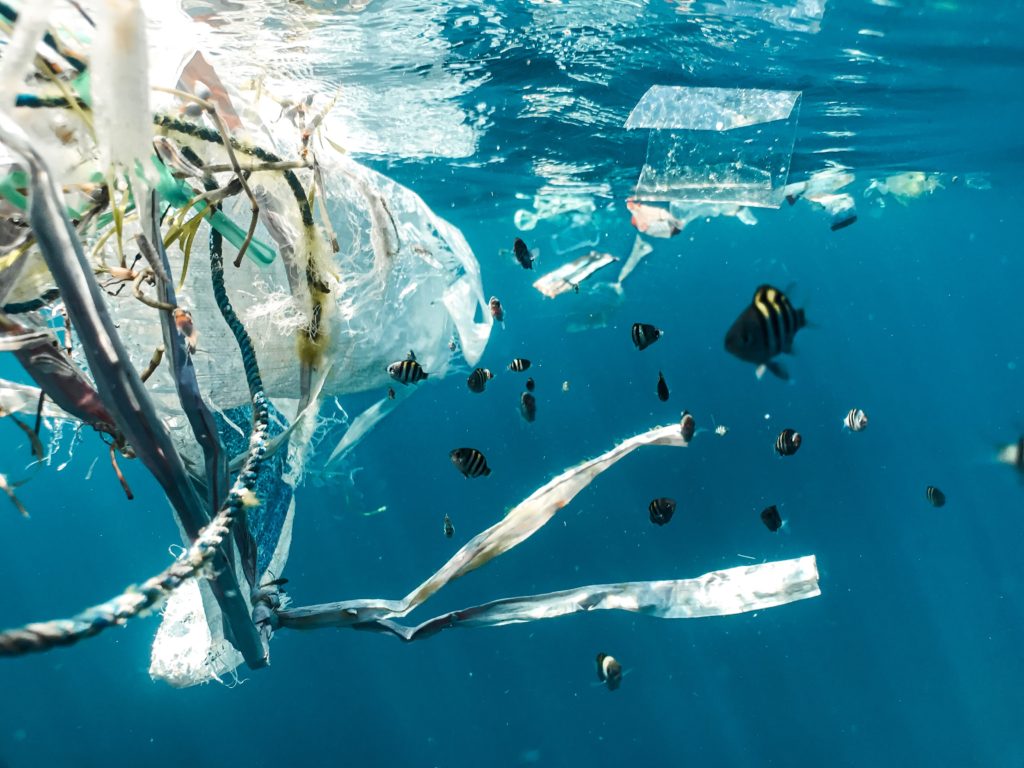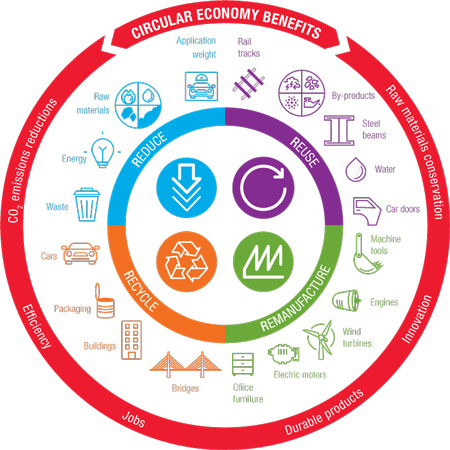Throughout history, humans existed in a system where very little, if anything was wasted. Money was scarce and things took a lot of time and effort to produce. Clothing was mended, building materials reused and food either eaten or composted.
Then, in the 20th century, automation and new technology caused the cost of products to plummet and their availability to surge. The age of mass consumerism had begun. Millions were lifted out of poverty, quality and length of life grew and we had access to abundance beyond our ancestors’ wildest dreams. But the inconvenient truth is that all of it was founded on a simple three-word model, which would one day bring the world to the edge of an ecological precipice (1).
Take – Make – Waste
Otherwise known as the Linear Economic System, the Take-Make-Waste model dominates the world in which we live. We take raw materials from the earth, make products with them and then, at the end of their life, we dispose of them and purchase something new. It’s a simple and remarkably effective system, but one which poses some significant questions.
What happens when the finite raw materials we use run out, or are taken beyond our reach by war or expense? How do we balance the need to preserve the natural world with our need to extract ever more from it? Where does the waste go and how does it affect the world once it’s disposed of? What happens to all the value that’s invested in the materials we use and then waste?

Not only are the answers to these questions unpalatable, but the negative results of Take–Make–Waste are now everywhere for us to see. Plastic chokes our oceans. Precious metals end up in landfill. And there isn’t now an environment on earth where the products of mankind cannot be found.
But what if it didn’t need to be this way? What if another system existed which could prevent waste, stabilise environments and lock-in value for both societies and businesses across the world?
Welcome, to the Circular Economy

In the simplest terms, the Circular Economy removes the ‘waste’ part of the Linear Economy and bends the traditional model back on itself – keeping products and resources ‘in use for as long as possible’, extracting ‘the maximum value from them while in use, then recovering and regenerating products and materials at the end of each service life’ (2).
It’s a model found in nature and embraced by our ancestors, and one which has been proven to be beneficial for the environment by preventing further degradation and destruction that comes from resource extraction and end-of-life pollution (3).
But even beyond the evident environmental benefits of working with materials we already have, building the principles of the Circular Economy into your business can have significant benefits for your business:
PROFIT
- The consumer goods industry uses $3.2 trillion worth of materials each year, yet only 20 percent of those materials are recovered. Designing your business in a way which allows for the recovery and repurposing of even a small fraction of this waste into new products would vastly increase profits by retaining the value of what has already been purchased. This in turn enables profit to be extracted multiple times from the same raw material while reducing costs in the long term (4).
- New services can be offered to customers for repair and reselling of your products, enabling businesses to grow and diversify (5).
- Profit can also be derived from outputs traditionally defined as waste. British Sugar has repurposed CO2 emissions to heat greenhouses for tomato growing and retains top-soil washed off its products for reselling to farms. Re-imagining new uses for waste can transform the nature of your business and produce huge revenue boosts (6).
- Designing a business which prevents waste by adopting a ‘use’ rather than ‘own’ model – whereby consumers hire your products for specific cases rather than buy them – could enable you to extract profit from a single item many times what you would have done should you have sold it (5). For example, a DIY shop could rent one drill to hundreds if not thousands of people across its lifetime, creating as much value as the ‘owned’ alternative but resulting in exponentially less waste.
RISK REDUCTION
- While securing the raw materials necessary for your products may usually be simple, it’s impossible to predict when issues in the global supply chain may arise. Price fluctuations and supply issues could render your products uncompetitive and interrupt your access to a key material at any time. Capturing the waste generated from your products allows you to gain control over the raw material, helping you to become more independent and sustainable (5). Consumer giant Unilever is doing just this in exploring refillable packaging in trials across the UK, a move which could end its reliance on sourcing virgin plastic (7).
REPUTATION AND CUSTOMER RELATIONSHIPS
- Research says that acquiring a new customer is anywhere from five to 25 times more expensive than retaining an existing one (8), so selling a product which you can re-furbish and repair over time can lock a consumer into your business ecosystem and allow you to continue a conversation over many years, saving you marketing money and securing an income flow into the future.
- 81% of consumers prefer to buy from companies which focus on sustainable solutions (9), so adopting a system which disrupts the Linear Economy and cuts waste in a visible and tangible way for consumers will encourage consumers to spend with your company. Recognising the importance of this, Nike provided teams at the Tokyo Olympics with kit made from 100% recycled polyester to show its commitment to circular principles (10).
Although the business benefits of the circular economy may not be as immediately obvious as the environmental ones, it’s clear that many large companies are beginning to wake up to the strong business case for change. Stepping out of tried-and-tested ways of conducting business is never easy, but the rewards for the first movers and those who master the emerging Circular Economy at scale will be huge.



